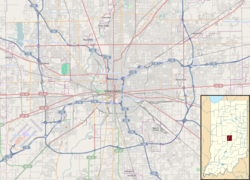Louis Levey Mansion | |
 Louis Levey Mansion, November 2010 | |
| Location | 2902 N. Meridian St., Indianapolis, Indiana |
|---|---|
| Coordinates | 39°48′30″N86°9′24″W / 39.80833°N 86.15667°W |
| Area | 1 acre (0.40 ha) |
| Built | 1905 |
| Architectural style | Late 19th And 20th Century Revivals |
| NRHP reference No. | 78000047 [1] |
| Added to NRHP | December 22, 1978 |
Louis Levey Mansion, also known as the Pilgrim Life Insurance Company Building, is a historic home located at Indianapolis, Indiana. It was built in 1905, and is a two-story, Italian Renaissance style limestone dwelling consisting of a three-bay-by-four-bay main block with a one-bay-by-two-bay rear block. It has a semicircular bay on the rear facade. The front facade features a round arched entrance flanked by pilasters and the roof is ringed by a balustrade. The house was converted for commercial uses in the 1950s. [2] : 2–3, 6
It was listed on the National Register of Historic Places in 1978. [1]


